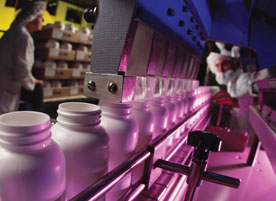

NAI's certified compliance with Good Manufacturing Practice (GMP) standards of quality manufacturing differentiates the company from competitors. NAI's customers have high expectations for product innovation, product integrity and quality control. |
|||

|
NAI stepped in when a customer experienced difficulties with a product produced by another manufacturer that was not consistently meeting quality standards. NAI's R&D group developed a new formulation and an improved manufacturing process to increase product stability, uniformity and consumer satisfaction. As a result, NAI became the new supplier of the product.
NAI's quality manufacturing is a strong selling point to current and prospective contract manufacturing customers and for direct-to-consumer partners. In October, 2002, the company was awarded a Good Manufacturing Practices (GMP) registration by the National Safety Foundation (NSF) under its new Dietary Supplements Certification Program. NAI is only the third supplements company to receive the registration, which was awarded after NSF conducted extensive audits at the company's plants in San Marcos and Vista, California. NSF is a not-for-profit, non-governmental organization that is the leading global provider of public health and safety-based risk management solutions. NAI also maintains GMP certification from the prestigious Therapeutics Goods Administration (TGA), an Australian government agency that regulates therapeutic goods for safety and efficacy. TGA certification is recognized internationally by more than 30 countries. Improvements to manufacturing operations in fiscal 2002 enhanced product quality, capacity and efficiencies. New analytical equipment increased quality control testing capabilities. Packaging was expanded to add capabilities for packets, a popular configuration combining several different formulas in convenient tear-open sachets. Expansion of piloting facilities in the San Marcos lab allows for more extensive testing of new formulations and for validating processes prior to full-scale manufacturing. New blending equipment facilitates product uniformity for ingredients with diverse properties and ensures precise dosage delivery for more difficult formulas. |